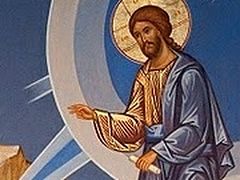The famous Serbian canon law specialist Bishop Nikodim (Milash) wrote the following in his interpretation of Canon 19 of the Sixth Ecumenical Council: “Holy Scripture is the word of God, revealing the will of God to man…” And St. Ignatius (Brianchaninov) says, “Read the Gospel with great reverence and attention. Consider nothing in it unimportant, or unworthy of consideration. Every iota emits a ray of life. Disregard for life is death.”
One author wrote about the Small Entrance in the Liturgy: “The Gospel is here a symbol of Christ. The Lord came into the world bodily, and personally. He entered in upon His preaching and His earthly ministry and found Himself here among us. Fearfully and majestically He acts, and among us God is perceptibly visible. The holy, heavenly angels are transfixed in awe at the sight. And you, man, partake of this great mystery and bow your head before it.”
Based on all the foregoing, we must understand that the Holy Gospel is the main book of mankind, in which is contained life for man. It contains Divine truths leading us to salvation. And it itself is the fountain of life—the word truly filled with the power and wisdom of the Lord.
The Gospel is the voice of Christ Himself. The Savior speaks to us in a symbolic and spiritual sense in our reading of the Gospel. We are as if transported in time to the flowering Galilean plains and become witness to the Incarnate Word of God. And He speaks not only universally and timelessly, in general, but to each of us concretely. The Gospel is not just a book. It is life for us; it is the spring of living water and the fountain of life. It is at the same time both the Law of God given to man for salvation, and accomplishes the Mystery of this salvation. The human soul is united with God and resurrects in Him upon reading the Gospel.
It is not by chance that the word “evangelios” translates from Greek as “the good news.” It indicates that the grace of the Holy Spirit has opened a new message and truth in the world: God has come to Earth for the salvation of mankind, and “God became man that man might become God,” as St. Athanasius of Alexandria said in the fourth century. The Lord has reconciled with man. He has healed him anew and revealed to him the path to the Heavenly Kingdom.
Either reading or hearing the Gospel, we stand upon this vertical heavenly road, and walk upon it to Paradise. This is what the Gospel is.
Therefore, it is very important to read the New Testament every day. According to the counsel of the holy fathers, we ought to include the reading of the Holy Gospel and the Apostol (The Acts of the Holy Apostles, the catholic epistles of the Apostles and the fourteen epistles of the holy and preeminent Apostle Paul) in our cell (home) rule of prayer. The following sequence is usually recommended: two chapters from the Apostol (some read one chapter), and one chapter of the Gospels every day.
In my view, based on personal experience, I would like to say that it’s more convenient to read the Holy Scriptures in order; that is, from the first chapter to the last, and then to start again. Then you can form a coherent picture of the Gospel narrative, and a sense and understanding of its continuity, and its cause-and-effect relationship.
It is also necessary that our reading of the Gospel not be like our reading of fiction, “feet crossed, comfortably nestled in an armchair.” It should be an act of liturgical home prayer.
In his book, The Law of God, Archpriest Seraphim Slobodskoy recommends reading the Holy Scriptures standing up, crossing yourself once before, and three times afterwards.
There are special prayers read before and after reading the New Testament.
Before
“Illumine our hearts, O Master Who lovest mankind, with the pure light of Thy divine knowledge. Open the eyes of our mind to the understanding of Thy Gospel teachings. Implant also in us the fear of Thy blessed commandments, that trampling down all carnal desires, we may enter upon a spiritual manner of living, both thinking and doing such things as are well-pleasing unto Thee. For Thou art the illumination of our souls and bodies, O Christ our God, and unto Thee we ascribe glory, together with Thy Father, Who is from everlasting, and Thine all-holy, good, and life-creating Spirit, now and ever and unto ages of ages. Amen.” The priest quietly reads this during the Divine Liturgy before the reading of the Holy Gospel. It is also placed after the Eleventh Kathisma of the Psalter.
A Prayer of St. John Chrysostom: “O Lord Jesus Christ, open Thou the eyes of my heart, that I may hear Thy word and understand and do Thy will, for I am a sojourner upon the earth. Hide not Thy commandments from me, but open mine eyes, that I may perceive the wonders of Thy law. Speak unto me the hidden and secret things of Thy wisdom. On Thee do I set my hope, O my God, that Thou shalt enlighten my mind and understanding with the light of Thy knowledge, not only to cherish those things which are written, but to do them; that in reading the lives and sayings of the saints I may not sin, but that such may serve for my restoration, enlightenment and sanctification, for the salvation of my soul, and the inheritance of life everlasting. For Thou art the enlightenment of those who lie in darkness, and from Thee cometh every good deed and every gift. Amen.”
A prayer of St. Ignatius (Brianchaninov), read before and after the reading of the Holy Scriptures: “Save, O Lord, and have mercy upon Thy servants (names) by the words of the Thy Holy Gospel, read for the salvation of Thy servants. May the thorns of all their transgressions fall O Lord, and may Thy grace be implanted in them, scorching, purifying, and sanctifying the whole man, in the name of the Father and of the Son and of the Holy Spirit. Amen.”
Regarding the latter, I would add that it is also read along with a chapter of the Holy Gospel in times of sorrow or trouble. In my own experience, I am convinced that it greatly helps, and the merciful Lord delivers us from every situation and trouble. Some of the fathers recommend reading this prayer with a chapter of the Gospels every day.
Of course, it is desirable to read not just the Holy Gospel, but also the commentary of the holy fathers, as much of the Holy Scriptures can be unclear for us as it comes from antiquity, and due to our spiritual inexperience.
This includes the commentary of St. John Chrysostom on the Gospel of Matthew, the Gospel commentaries of Blessed Theophylact of Bulgaria, the Gospel commentaries of B. I. Gladkov, highly valued by the holy, righteous John of Kronstadt, the works of Archbishop Averky (Taushev), and Metropolitan Benjamin (Pushkari), the Explanatory Bible: Old and New Testaments of Alexander Polukhin, and other works.1
Let us bow down, brothers and sisters, who hunger and thirst after righteousness, with our hearts, to the pure life-giving source of Holy Scripture. Without it, the soul is doomed to decay and spiritual death. With it the soul blossoms, as paradisiacal flowers, saturated with verbal, life-giving dew, worthy of the Kingdom of Heaven.




